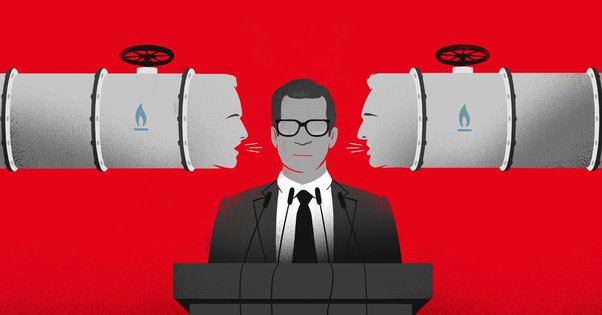The ongoing gas crisis is the latest reminder that Europe’s energy system privatises polluters’ profits while socialising the risks to people and planet.
The EU’s commitment to a just transition is facing a key test as energy bills skyrocket for ordinary people and fossil fuel companies benefit. Investors and governments committed to the Paris Agreement should not be fooled by the arguments of fossil fuel companies and their lobbyists that this crisis needs more investment in gas— this is a crisis driven by our dependence on fossil fuels. The only way out is to end the fossil gas era now.
A cash machine for polluters
The last few months have proven astronomically lucrative for gas producing companies and their shareholders. BP’s CEO, Bernard Looney, likened the high prices to a cash machine, suggesting a jubilant mood in the boardrooms of fossil fuel giants.
We looked at the profits of eight of the world's major fossil gas producers — Chevron, Exxon, Shell, BP, Equinor, Total, Gazprom and Eni. All firms have benefitted from the soaring rise in wholesale gas prices; fossil gas made up about 30% to 60% of their free cash flow (their income minus their spending) in 2021.
Across the board, it was a bonanza. Most companies reported their highest profits in at least half a decade, with an overall total of $119 billion. This represents a remarkable rebound from the lull due to the pandemic. Gazprom has not released its fourth quarter profits yet but expects record breaking results. In November the Russian gas giant reported its highest ever quarterly profits.
The gas market crisis is driving up producer profits
Put together in 2021 this set of gas producers made profits of an eye-watering $226,000 a minute.
Crunch time for European consumers
Outside the boardrooms of gas companies, there is a bleaker side to the fourfold rise in European wholesale gas prices: surging energy bills that are driving millions into poverty.
Even before the pandemic, one in four European households struggled to keep their homes warm, cool or adequately lit. Persistent delays to reducing Europe’s reliance on fossil fuels have left people heavily dependent on gas for electricity, heating and cooking.
On average, Europeans have seen their gas prices rise by almost a quarter last year. Since fossil gas generates around one-fifth of the EU’s electricity, consumer electricity prices rose by an average of 16% as well.
These averages hide the plight of people on the sharp end of the crisis: Italians are at risk of paying over €900 more on energy bills in 2022; an increase in the UK’s energy price cap will add around £700 to the average Brit’s annual bill; and in Greece, where households already receive a monthly electricity subsidy of €39, energy bills increased by an average of €100 in December alone.
These spikes in gas and electricity bills are primarily due to the increase in wholesale gas prices. Yet, some – Hungarian prime minister Viktor Orbán among them – falsely claim that rising carbon prices are to blame. Explore the data to see for yourself that rising gas prices hugely outweigh the effect of carbon prices. As Fatih Birol, the head of the International Energy Agency (IEA) pointed out: “This is not a renewables or a clean energy crisis; this is a natural gas market crisis.”
The cost of fossil gas is driving the increase in bills, not the carbon price
Governments across the European Union are rightly stepping in to protect their citizens from the effects of this crisis on the cost of living. In the short run, more needs to be done to shield the most vulnerable from the brunt of a volatile, fossil gas-dependent energy system. However, as elected officials spend billions of taxpayer funds on price caps, tax reductions, one-off payments and loans to low-income households and small businesses, they need to ensure that there is systemic change so that the public does not keep subsidising or paying for high gas prices in the long run. Otherwise, fossil gas companies and their shareholders will continue to profit off the plight of ordinary Europeans.
Where do the profits go?
All the fossil gas companies we looked at have well-publicised “plans” to achieve carbon neutrality for their operations and many speak of ramping up investments in renewables, but there is little, if any suggestion that 2021’s windfall profits will be used to accelerate the transition. As many have shown, including our own work and an academic study published earlier this month, oil and gas companies have a habit of talking up their climate ambition without this translating into much action.
The priority for most of the companies we looked at has been returning the surplus cash to shareholders through dividends and boosted share buyback schemes, whilst continuing to invest heavily in oil and gas extraction. Investment pledges on renewables remain weak.
The IEA laid out the scale of the challenge clearly: spending on renewable energy must triple by the end of the decade to make good on the ambition of the Paris Agreement. Fossil fuel companies cannot be relied on to deliver this investment. In 2020, clean energy investments by the industry only accounted for 1% of their total capital expenditure. In February 2021, Shell pledged to spend between two and three billion dollars on renewables, a figure no bigger than their marketing budget. While Total and BP have recently committed to increasing the proportion of their total investments in the energy transition by 2025, fossil fuel companies’ plans when it comes to investment in renewables remain inadequate.
According to Oil Change International not a single company that we looked at has committed to halt all new oil and gas exploration. When BP announced its Q4 2021 profits, it made some vague but positive noises about transition spending, but a map at the end of its investor briefing showed opportunities for exploration drilling for gas in seven regions across the globe, making a mockery of BP’s claim that its plans are aligned with the Paris Agreement. As the IEA and others have clearly set out, development of all new oil and gas fields is incompatible with keeping global temperatures below 1.5 C.
The EU needs to re-commit to a just transition
This gas price crunch shows what is to come if Europe does not break away from its dependence on gas: volatile and crushing bills for the people, record-breaking profits for polluters and the all-encompassing risks of climate breakdown to frontline communities and future generations.
More substantial and longer-term measures — not just temporary relief — are needed to protect the most vulnerable from the gas crisis. They have been left out in the cold for too long. The Right to Energy coalition, which fights energy poverty across the continent, has been calling on European leaders for years: ban disconnections, guarantee minimum levels of energy for all and renovate Europe’s dilapidated housing stock to secure everyone’s right to clean and affordable energy. The World Health Organisation estimates that indoor cold is responsible for 38,200 excess deaths across 11 European countries each year. The current crisis risks adding to this grim tally.
Despite the ambitions of the European Green Deal, the signs are not promising. The EU Commission has proposed labelling fossil gas projects as sustainable investments and fossil gas-based hydrogen as a climate-friendly fuel. These actions point to the oversized influence of the fossil gas lobby in Europe’s corridors of power. Tellingly, the Commission wants to give the gas industry even more influence over the planning of gas and hydrogen infrastructure in an upcoming reform of the EU gas market, spurning the opportunity to cut fossil fuel companies out of decision making.
Europe needs a robust framework to phase out fossil gas use — in our electricity grid and in our homes — one that ensures the human right to clean and affordable energy and re-affirms the commitment to a just transition away from all fossil fuels. This won’t be possible if the fossil gas lobby continues to profit and keeps its seat at the table. Let’s have a fossil-free politics and put an end to the fossil gas era.


